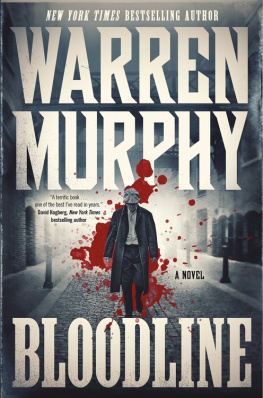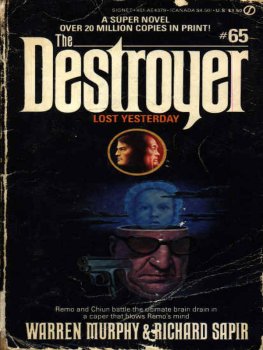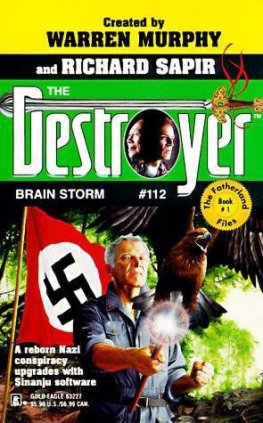Time Trial
The Destroyer #53
by Richard Sapir & Warren Murphy
Copyright 1983
by Richard Sapir & Warren Murphy
All rights reserved.
Time Trial
A Peanut Press Book
Published by
peanutpress.com, Inc.
www.peanutpress.com
ISBN: 0-7408-0576-2
First Peanut Press Edition
This edition published by
arrangement with
Boondock Books
www.boondockbooks.com
A Dedication: For Kathy Rook, whose stories are wonderful; for Archie Edward Hinson, $2 worth; and for the Princeton Karate Club 'cause Megan said so. Warren Murphy
And an Interruption:
Hold! What are these idiotic inscriptions? Who are these people? I, Chiun, now dedicate this book properly. For Don Davisson and Sally Vogel who are disgusted with all of you and the way you have ignored me for years and who have now formed The House of Sinanju Tribute Society, Post Office Box 17593, Portland, Oregon 97217. This is a good thing and I, the Master of Sinanju, approve.
Chiun
?Chapter One
The priest led the procession through the cave of Puch, god of the Underworld. Past the six snarling heads of felled jaguars in the Hall of Balam they came, the holy men who chanted, holding aloft the dead sacrificed birds. Warriors walked behind them, chieftains gathered from distant jungle tribes.
They were Olmec, each marked by a black spot of ash on his forehead. They moved slowly, in secrecy, because that was the way of the Olmec. Secrecy brought power, and so they walked softly into the Inner Chambers, where the magic would take place.
Past the stone sentry of a man bearing an ape's head they came, past the Wall of Days, where garishly colored paintings depicted the Olmec's enemies in obscene postures, then past the demonic likeness of Puch himself, Master of the Dead, tangled snakes emanating from his ears, his luminescent jade eyes glowing.
Ahead of them all walked the high priest, the h'men or visionary, he of the Sight. Festooned in spotted cat skins, his hair matted and stinking of blood from the birds sacrificed in the way of his people, he prepared for the ceremony to come, pulling his strength inward, blocking out his senses until he could hear only the heavy thrum of his own heartbeat, accentuated with every pace by the movement of the amber amulet he wore around his neck.
The amulet was a talisman, believed by the Olmec to bring on visions of the future that only the ordained high priests of their tribe could see. But the priest himself knew the stone to be worthless.
He had possessed the Sight since he was a child. The priests who had worn the amulet then, had known nothing of what was to come to their people, but even as a child he had known. In his visions, he knew that what was to come was no less than the curse of Puch himself.
Death. Death for all of them. Death for ages, forever. He had known it then, but no one had listened. Now the elder priests were dead, killed by their own people, and the young h'men had risen to wear the amulet of leadership. If he had failed, he, too, would have died.
But he did not fail, and what lay in the innermost chamber of the cave proved his victory. His vision had foreseen that the gods would come to rule the Olmec's enemies in the kingdom on the other side of the fire mountain Bocatan, and that those enemies would prevail. The visions were true; they were always true. The strange gods in their flying sky-chariot had come to aid the Olmec's enemies with weapons wrought from shafts of lightning, which they held in their bare hands. The Olmec had been driven away, forbidden to walk above ground.
But even the gods can be challenged. And if they are conquered, the future can be changed. The Olmec had both challenged and conquered the enemy gods, who lay now, captured, defeated, inside the inner chamber of the cave, their hands and legs bound like those of ordinary mortals, their throats parched, the taste of fear in their mouths. The gods waited to die.
The entourage halted at the entrance to the chamber as five of the warriors rolled away the great stone that served as a door. Inside, the holy men placed the dead birds at the feet of the stone likeness of Puch, which dominated the cold room. Demonic-looking obsidian snakes guarded the chamber from the curse of light. The high priest stepped forward.
"Hear me, O Dread One," he intoned, raising his arms high. "For you have we defied the prophecies. For you have we seized the enemy gods. For you do we make sacrifice of them."
He lowered his arms and turned to face the altar across the chamber. Six stone slabs stretched across the length of the room. On top of each was one of the fallen deities, bound and helpless. They craned their necks to watch the priest as he prepared to come to them.
From the clothes they wore, each of the holy men took the snow-white spine of a sting ray and placed it at the priest's feet. Kneeling, the priest picked them up and pierced his flesh with them: his arms, his chest, belly, thighs, and hands. The darts were painful; they ripped the flesh where they struck and caused the priest's blood to fall in heavy droplets to the ground, but the priest's face remained expressionless. Ahead of him lay the bed of burning coals to be used in his final purification. Smoke rose from it like steam.
He stood, hearing his heart beat slower and deeper, as the blood falling around his feet became a pool of red, his body streaked. He would feel no pain now. The moment had come. He walked forward.
The burning coals bit into his bare feet like hungry animals, crumbling beneath his weight. Blood coursing down his arms mingled with the sweat of pain and heat and dripped off his fingers to sizzle on the steaming, spitting coals. He was the h'men, he of the Sight; in his hands lay the future of his people. He moved silently, steadily, leaving a trail of burning blood behind.
The enemy gods watched. They were amazed, their alien features twisted. All but the leader. He watched, too, but his face was different. It held a look of serene detachment, even of excitement. This god, possibly because he was a god, was not afraid to die. When the high priest stepped off the coals to stand directly before them, the gods began to babble in fear. One cried out. Another wept when the priest removed the great carved obsidian dagger from his belt and walked behind them, into position. Only the leader-god's face remained impassive. He spoke something in his strange tongue, and the weeping god became silent. As the priest held the dagger high above the leader-god's head, the others chanted a strange prayer in unison. The leader did not join them.
He watched the priest. For a moment, the priest was distracted by the god's strange eyes. They were clouded, as if behind them were a deep mist, but unafraid. The priest respected this god, even if he was not of the Olmec. When the ceremony was over, he would command that the bodies of the others be given to the fire mountain Bocatan as offering. But the leader's would remain here, where his spirit would serve Puch. This one was worthy of Puch.
"Dread One, I commend them to you," the priest said. Then, with one powerful downward thrust, he plunged the dagger into the forehead of the leader-god. Blood spurted out of him, streaming over the silver garment he wore, cloth that felt wet to the touch, even when dry. Now the blood ran off the strange clothing as if it were running off a bank of clay. The god's world, the priest thought, must be a strange place indeed.
The others shrieked like cowards. They were the lesser gods, unworthy. The priest finished them off quickly, lodging the dagger where he could. When he was finished, his arms were covered with blood and bone.
"Begone with them," the priest said with contempt. "But the king god stays here. Bring wine and bread for his sustenance in the Land of the Dead."
Next page



